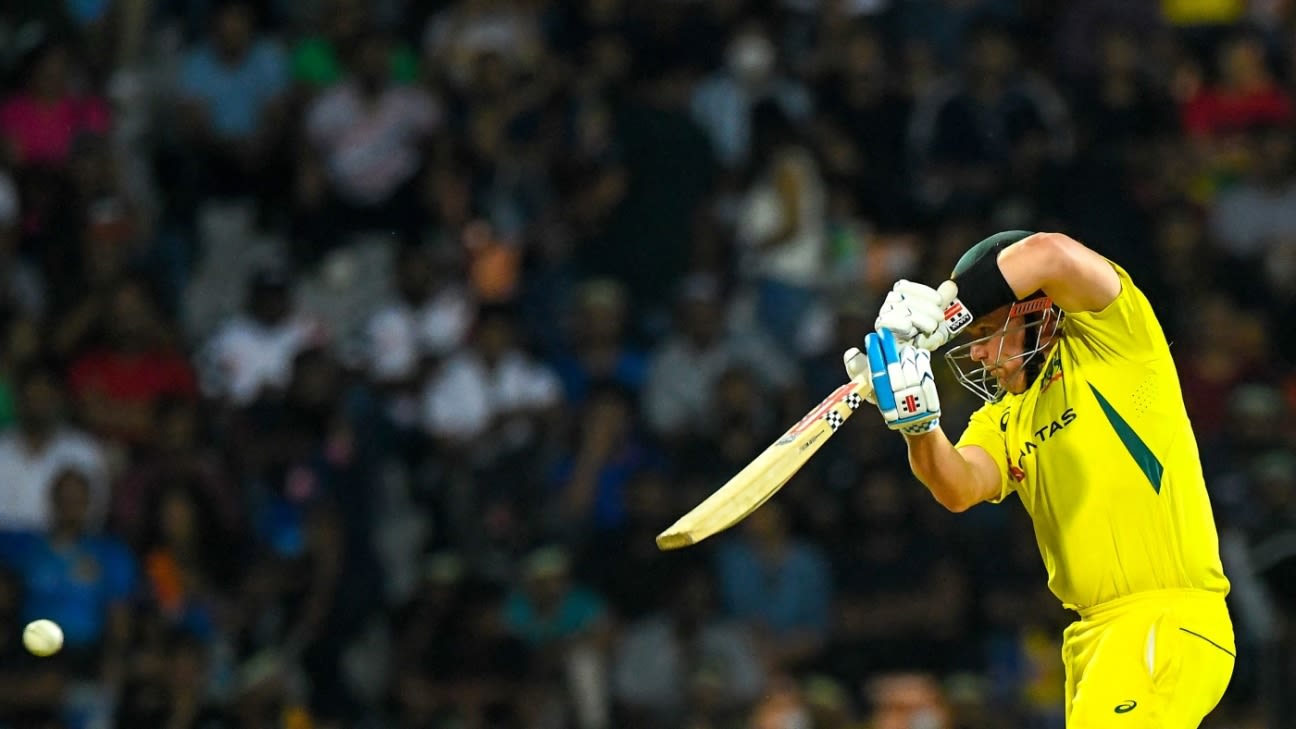Finch made his ODI debut in January 2013, against Sri Lanka at the MCG, two years after his international debut in T20Is. He scored 16 opening the batting with the late Phillip Hughes, who was also on debut and struck a century, before falling to Ajantha Mendis after a half-century partnership. The current national selector George Bailey was Australia’s captain while current team-mates Mitchell Starc and Glenn Maxwell were also in the XI.
“Debuting at the MCG against Sri Lanka, think I only got 16 but it was something you dream of, to play at the MCG as a Victorian and also debut there,” Finch said. “Never taking anything like that for granted is really important.”
“You don’t know if you’ll be able to play a third game, so to be able to play 145 is pretty special,” he said
World Cup triumph on home soil
By the start of the 2015 World Cup, Finch had built a very solid ODI record and had five centuries under his belt. He helped set the tone for Australia’s tournament with 135 in their opening match against England at the MCG after being dropped before he had scored in the first over.
“The World Cup is the pinnacle of one-day cricket, so to win that on home soil at the MCG was really special,” Finch said.
By the time of the next ODI World Cup in England, Finch was captain but the lead-up had been far from smooth. He had taken over in the wake of the ball-tampering scandal and struggled for form during the 2018-19 home season against South Africa and India. However, he made 93 in Ranchi to help spark a personal and team turnaround which saw Australia come from 2-0 down to take the series. Finch then went on a prolific run with back-to-back hundreds against Pakistan and two more in the World Cup that followed, although Australia’s tournament ended in the semi-final at the hands of England.
“Coming back from 2-0 down against India in India, the first team to ever do that to win 3-2, that was something that was so huge for us at the time because it was a little transition phase in the lead-up to the World Cup in England and we hadn’t been in great form,” Finch recalled. “So to go there, have our backs against the wall and win was really special, then we beat Pakistan 5-0 and started the World Cup really well. That’s something that really stands out in my mind as a special series.”
Repairing Australia’s image
In the immediate aftermath of Smith being banned after the Newlands controversy, Tim Paine briefly took the ODI captaincy. But Finch was soon installed and was widely considered to have played an important role in improving the men’s team’s image, although he was keen to deflect praise.
“There’s a lot of people who have done a lot of hard work to ensure that Australian cricket is in a better place,” he said. “I’m really proud and happy with the job I’ve done leading two formats of the team. It’s certainly not just me, I can tell you that, there’s been so many people who have done some great work. The way we play over the three formats, it’s exciting to watch, it’s always attacking and aggressive. I think cricket is in a pretty good place now.”
Watching others grow
On the field as well as off it, the Australia men’s limited-overs game needed some significant rebuilding when Finch took charge. While they remain mid-table, currently ranked No. 5, and have some top-order batting questions to resolve, there is the nucleus of a strong side. Finch specifically referenced the development of the spinners, Adam Zampa and Ashton Agar, across both limited-overs formats.
“Just watching people grow as players and giving them different roles and responsibilities is really special and something I’ll look back on and be really proud,” he said. “When you continue to see guys performing in international cricket and realise you may have been a very small part of allowing them to grow.
“To see the rise of Zamps over the last couple of years has been something that I’ve been really proud of as well and Ashton Agar… to see them grow into the roles they have played over the last couple of years has been one of my biggest satisfactions. I’ve loved every bit of that.”
Andrew McGlashan is a deputy editor at ESPNcricinfo
